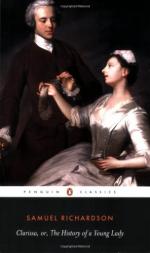You are an excellent woman, Mrs. Lovick: I know that, by my cousin John Belford’s account of you: and Miss Clarissa Harlowe is an angel.
Miss Harlowe is indeed an angel, replied she; and soon will be company for angels.
No jesting with such a woman as this, Jack.
Tell me of a truth, good Mrs. Lovick, where I may see this dear lady. Upon my soul, I will neither fright for offend her. I will only beg of her to hear me speak for one half-quarter of an hour; and, if she will have it so, I will never trouble her more.
Sir, said the widow, it would be death for her to see you. She was at home last night; I’ll tell you truth: but fitter to be in bed all day. She came home, she said, to die; and, if she could not avoid your visit, she was unable to fly from you; and believed she should die in your presence.
And yet go out again this morning early? How can that be, widow?
Why, Sir, she rested not two hours, for fear of you. Her fear gave her strength, which she’ll suffer for, when that fear is over. And finding herself, the more she thought of your visit, the less able to stay to receive it, she took chair, and is gone nobody knows whither. But, I believe, she intended to be carried to the waterside, in order to take boat; for she cannot bear a coach. It extremely incommoded her yesterday.
But before we talk any further, said I, if she be gone abroad, you can have no objection to my looking into every apartment above and below; because I am told she is actually in the house.
Indeed, Sir, she is not. You may satisfy yourself, if you please: but Mrs. Smith and I waited on her to her chair. We were forced to support her, she was so weak. She said, Whither can I go, Mrs. Lovick? whither can I go, Mrs. Smith?—Cruel, cruel man!—tell him I called him so, if he come again!—God give him that peace which he denies me!
Sweet creature! cried I; and looked down, and took out my handkerchief.
The widow wept. I wish, said she, I had never known so excellent a lady, and so great a sufferer! I love her as my own child!
Mrs. Smith wept.
I then gave over the hope of seeing her for this time, I was extremely chagrined at my disappointment, and at the account they gave of her ill health.
Would to Heaven, said I, she would put it in my power to repair her wrongs! I have been an ungrateful wretch to her. I need not tell you, Mrs. Lovick, how much I have injured her, nor how much she suffers by her relations’ implacableness, Mrs. Smith, that cuts her to the heart. Her family is the most implacable family on earth; and the dear creature, in refusing to see me, and to be reconciled to me, shows her relation to them a little too plainly.
O Sir, said the widow, not one syllable of what you say belongs to this lady. I never saw so sweet a temper! she is always accusing herself, and excusing her relations. And, as to you, Sir, she forgives you: she wishes you well; and happier than you will let her die in peace? ’tis all she wishes for. You don’t look like a hard-hearted gentleman!—How can you thus hunt and persecute a poor lady, whom none of her relations will look upon? It makes my heart bleed for her.




